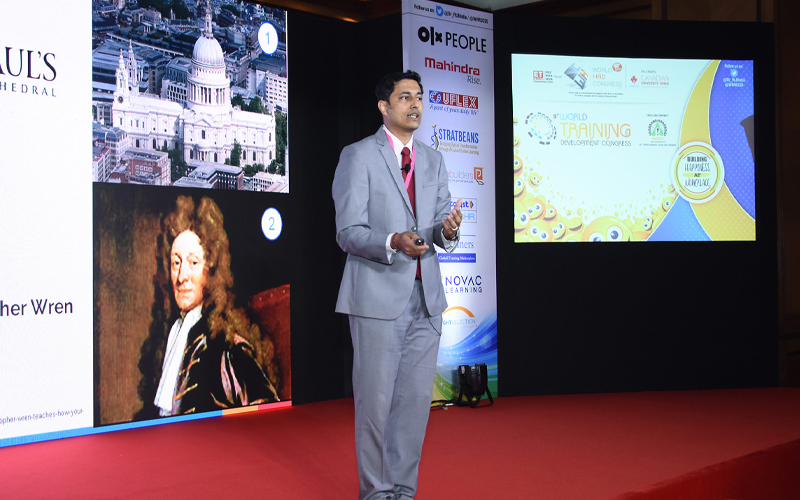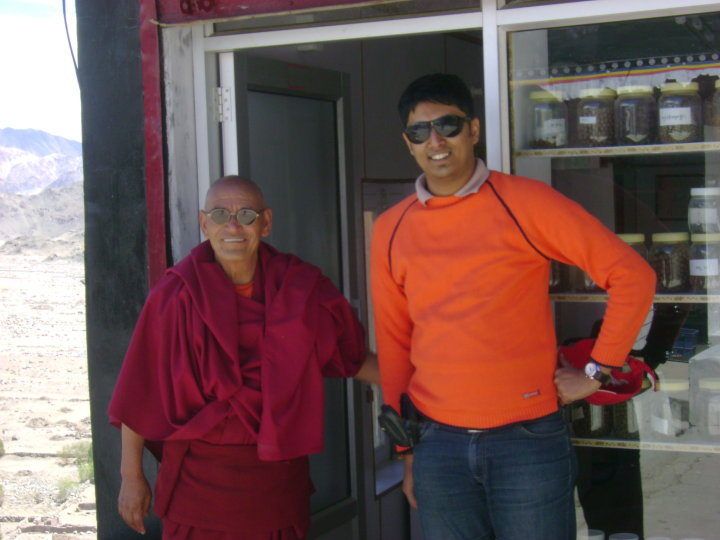During his 18 years as a coach, L&D leader and keynote speaker, Rohan Nabar has trained 20,000 people and coached over a thousand leaders across the globe. Not surprisingly, consequently he has gained a lot of invaluable insight into human nature.
While he has spent many years working in technology sectors, Rohan is very focused on the human element and on valuable soft skills. He champions the importance of people, of people gaining self awareness and of using this self awareness to be in tune with strengths and weaknesses..

Read on to find out more about his views on the importance of service in finding success and why he prioritizes attitude over skills in hirees.
GLEAC: If a future version of yourself had to thank you for something you are doing right now that will contribute to your future, what would it be for?
ROHAN:. I have learnt to be kinder to myself, to reflect on the positives of what I carry as strengths and to make a positive impact on the people I come across. The younger version of me was harsh towards myself and had extremely unreal expectations of myself.
Irrespective of who I am 20 years (or beyond) from now, I’m sure my future self will thank me for this change which has helped me be the person I would like to be.
GLEAC: What is your superpower soft skill (it can be one or a few)? How do you use it in your job in your sector?
ROHAN:. I’m not sure if these would qualify to be super powers, but there are a few things that help me work with people, whether these are my team members, customers or partners/service providers.
Firstly, in my interactions with people, I am able to look at the human being before the professional. This helps me empathize with everyone I work with and helps build a bond that isn’t limited to just transactional exchanges at that point.
Secondly, I’m blessed with being able to help individuals reflect and get a better understanding of themselves. I’m happy that I have been able to make this into my profession.
Lastly, I have had exposure to a global audience, and eventually, I began working with teams across the globe. I am able to work comfortably in these cross-cultural environments. In fact, I thrive in multicultural setups. ‘
A combination of these “super powers” have helped me establish and grow a career. (I wouldn’t limit their use to a single job).
GLEAC: How does your job impact the balance sheet of your company? Which departments does it affect and how?
ROHAN:. I have had the privilege of working across consulting and corporate set ups.
In consulting, the work I (or my teams) did would always be charged to the client and hence would directly drive revenues. Learning and organization development in the corporate setups have traditionally been considered a cost centre. I have been fortunate though in most of my stints over the last couple of decades that I have had the opportunity to create and to deliver learning that has driven business impact.
To take a couple of examples, the work I have done for sales teams in the past has resulted in extensive lead generation, sales funnel acceleration and increased share of wallet with customers among other aspects.
The work I have done with customer service teams has resulted in a direct impact on team morale and a change in customer satisfaction numbers.
With this philosophy, I’m always in search of identifying how to solve business problems through learning and having a belief in less is more as far as learning interventions are concerned.

GLEAC: With all the changes happening in the world, is your sector going to survive, and if yes, why? If it won’t be viable anymore in its present form, how does it have to change to survive and evolve?
ROHAN: I have always been in the business of working with people. Research across the world is currently predicting two strong themes.
Firstly, while new technology may displace people, there will be a whole lot more jobs created due to that as people will be driven to learn the skills of the future. Secondly the skills of the future aren’t only technology based aspects (viz. AI- artificial intelligence) but human skills (viz. EI-emotional intelligence). So the business of people is here to stay (and to thrive).
How organizations engage with professionals may differ in the future, with a whole lot more gig-workforce coming through, and hence business models may undergo some change; however, as long as organizations evolve to meet customer needs and business models of the future, there is no way the sector would not thrive or grow.
GLEAC: if you had to attract more talent to your team from another sector, who would you want, and with what skill sets?
ROHAN: I’m a firm believer in hiring for attitude and training for skills, and so my focus is always to dig deeper.
You could call the attitude the operating system and the skills the applications that could be built on them. If the fundamentals aren’t in place, one could build a whole lot on it, and it wouldn’t matter.
If there is one skill I look for, it is “human centeredness”. Over the years, I have hired a whole lot of professionals across all of my roles and within different organizations and sectors, and this skill has almost always trumped all other sector/function specific skills.
GLEAC: What are three must-have soft skills for newbies looking to enter your sector?
ROHAN: Self-Awareness, ability to influence and ability to collaborate openly are the most important soft skills in that order.
GLEAC: Are there any soft skills you need to work on to better yourself?
ROHAN: There are many that come to my mind; however, two most fundamental ones come through. The first is self awareness. I need to understand the various facets of who people are, that is important in any profession. Knowing your strengths almost always helps you scale the summit, and knowing your weaknesses most often helps you avoid falling off the cliff.
Second, I need to learn to be empathetic. No one starts the day wanting to make mistakes or fail at the work they do. If there has been an error done by someone, there would almost always be a genuine reason for it. I’d say trying to find out more about a choice you have made helps you be part of the problem or be a part of the solution to help make things happen.
I constantly keep focusing on these two soft skills to ensure I am a “better person” before being a “better professional”
GLEAC: If you had to explain your job to a 5-year-old, how would you do it?
ROHAN: I have two sons and one of them is five, so this is a fantastic question to answer.
I would tell a five-year-old, I work with people to help them study themselves and learn the skills of interacting with others.
GLEAC: What is the one thing you learned on your professional journey you would like to share with the world?
ROHAN:If you work with a mind-set to serve people and to see the larger purpose almost certainly results would follow. You could be working in any sector or industry. I have worked in information technology, medical technology and staffing, among others. Wanting to serve people and understanding how that matters in the larger scheme of things have helped me grow and achieve a whole lot more than I could have if I were more transactional in my approach.
GLEAC: Work in your sector can get rigorous. How do you keep up the mojo?
ROHAN: Working with people can get draining; however, learning keeps you on your toes. Albert Einstein has been quoted as saying, “The more I learn, the more I realize I don’t know”. My motto always is “Always be learning”.
Every single day, I make it a point to read or watch TED Talks in the short breaks I have. I work through courses over the weekends, and I’m listening to podcasts on my drive to and from work everyday.
Learning new things every day keeps me driven, and then sharing the learnings with everyone I interact with keeps me powered and hungry for more.
Interested in enhancing your skills under the guidance of this distinguished mentor? Visit their profile and book a time to Learn more about this mentor Here

